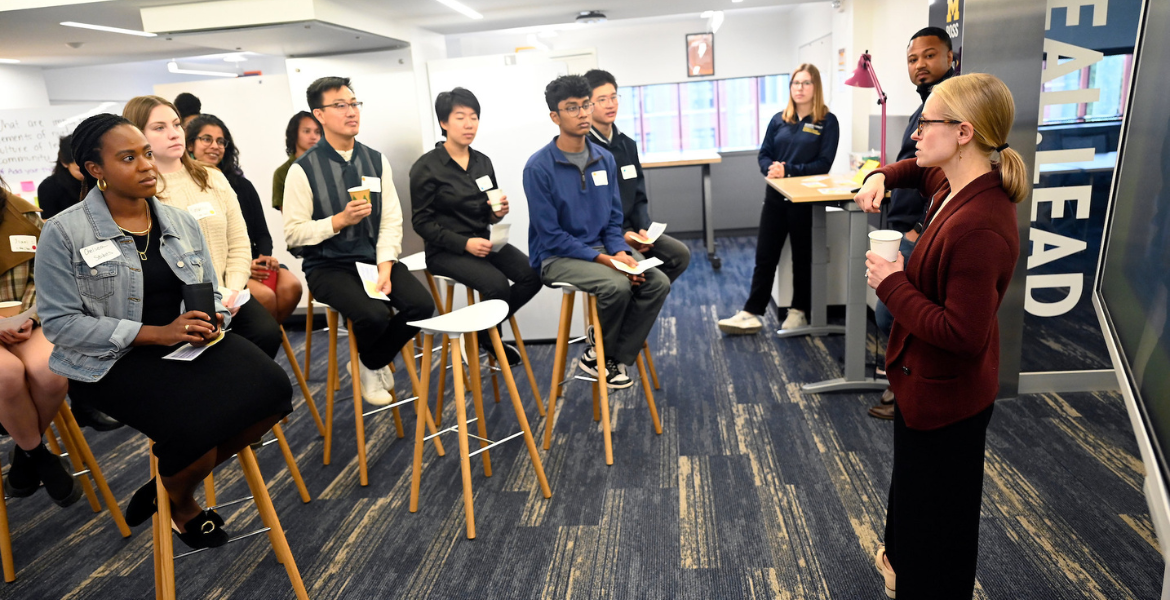The history of Business+Impact is a genesis. At the heart of that genesis has always been the concepts of multi-disciplinary, action-based partnerships between students and changemakers on the ground, and collaborations between scholars and business leaders.
Our History

In 1992, the U-M Business School launched the Domestic Corps program.
Domestic Corps grew out of a program that sent students abroad to emerging economies such as Poland and Russia for management consulting. The students were subsequently sent to domestic community organizations and nonprofits to advance mission-critical goals. Leveraging business school talent for domestic community impact was a pioneering effort, and was developed into a robust summer internship program for dozens of MBAs annually.
The program evolved into Impact Corps, which provided strategic solutions and implementation for a wide range of social impact organizations.
In 1997, the University of Michigan schools of Business, Public Policy, and Social Work launched a Nonprofit and Public Management (NPM) Center.
Founding director Janet Weiss of the Ross and Ford schools envisioned NPM as a cross-discipline research center, which grew into a space for students to work side-by-side with nonprofits and government. Shared interests across schools and sectors led to internships, speakers, and new courses.
Beginning in 2014, the team shifted a few NPM programs to the newly launched Center for Social Impact at Ross, and a revamped NPM re-located to the Ford School of Public Policy with a stronger research focus.
In 2003, one of the first and longest-running Board Fellowship programs in the country began.
NPM co-founder Diana Vinokur originally designed this program for graduate business students to be placed on nonprofit governing boards across southeast Michigan. Board Fellows expanded to social work and public policy, and eventually included graduate and professional students across campus.
This popular program has migrated to Business+Impact to continue engagement with leading nonprofit boards. Since 2003, 450+ Board Fellows have been placed on 200 nonprofit boards.
In 2012, CSI Managing Director Rishi Moudgil introduced the Social Impact Challenge (SIC) – an all-campus engagement for collective problem-solving around a complex social issue. In the pilot year of 2012, the first multidisciplinary SIC partnered with Year Up Chicago. This nonprofit’s mission is to close the opportunity divide by providing urban young adults with the skills, experience, and support that will empower them to reach their potential through professional careers and higher education.
The program continued under the impact design leadership of Cat Johnson and Matt Kelterborn for six years until the last challenge in 2018:
- In 2013, the challenge focused on education as students worked with Education Pioneers in tackling an important national issue — how to create a better pipeline of leaders into the space.
- The 2014 partner was Detroit Future City (DFC), which is leading implementation of the DFC Strategic Framework, a comprehensive plan to achieve fiscal sustainability and improve quality of life for all Detroiters. That 2014 Challenge focused on strategies to improve transportation access for Detroit’s neighborhoods.
- The 2015 teams designed proposals for the redevelopment of Fisher Body Plant 21 in Detroit’s North End, infusing arts and culture, sustainability, community, and economic development.
- In 2016, students tackled strategic and operational questions to help launch Detroit PAL’s Kids At the Corner Campaign in partnership with the Old Tiger Stadium Conservancy, which involves the redevelopment of the historic field.
- In 2017, the Social Impact Challenge teamed up with UM-Flint Outreach and Skypoint Ventures to help Ann Arbor and Flint students focus on economic development and entrepreneurship in the city of Flint, MI.
- In 2018, Social Impact Challenge teamed up with Detroit Economic Growth Corporation for a competition focused on pop-ups, which can encourage neighborhood revitalization and small business development in Detroit.
The Center for Social Impact launched as a Michigan Ross center in 2014 to catalyze action-based efforts for preparing and inspiring leaders to tackle social challenges. While based at the Ross School of Business, the key tenets of the center include working across disciplines, schools, and sectors on practical learning experiences that also produce positive social outcomes.
Throughout 2017, Associate Dean Jerry Davis in tandem with the Center for Social Impact ran a series of three Impact@Ross events with key impact stakeholders across campus — to create a plan for expressing Dean DeRue’s vision of a business school initiative around social and environmental impact.
The Business+Impact initiative was announced in August 2018, with a goal of making Michigan Ross “the most progressive source of ideas and solutions for how business can address the global challenges of our generation.” Business+Impact is a dean-level initiative to make social, economic and sustainability impact part of the DNA of Ross.
Additionally, research, the Impact Studio, programs, and the Impact Across U-M portal are part of B+I’s goal of providing and informing impact opportunities to students at Michigan Ross and across campus.
Many programs from the Center for Social Impact continue under the auspices of Business+Impact, and new programs will emerge.
In 2019, Business+Impact brought on inaugural Managing Director Cat Johnson, and launched the Impact Studio, which encompasses a dynamic collaborative space for social innovation, an interdisciplinary graduate course, a social venture incubator, and a series of workshops and events. The studio uses design, business, and research insights to bring ideas to life that build a just and sustainable future. The Impact Studio course BA670 was awarded the Aspen Institute Ideas Worth Teaching award.

